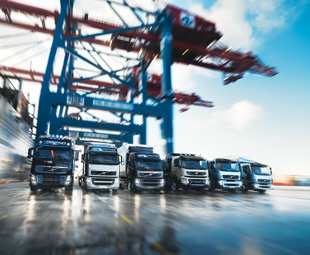Not a fleeting concern

Effective fleet management can reduce costs and risks for any business. CLAIRE RENCKEN speaks to some experts in the field to gain some insights
Managing transportation in the fleet industry is not only fundamental to maintaining a competitive advantage, but also to increasing profitability and reducing fraudulent activity. Malcolm Rabson, MD at Dariel Solutions, makes some interesting observations: “With goods sometimes being on the road for days, it is essential to ensure that the transportation is managed correctly from a supply and demand perspective as well.
“One of the biggest challenges is fraud. Current fleet systems are not flexible enough to deal with variances. This delays the logistical process, as the goods need to be physically accounted for or checked by slow, outdated computer systems. This ultimately results in lost goods and lost productivity.”
To address this problem, Dariel Solutions developed its weighbridge solution (WBX). It allows for electronic and instant monitoring of the goods-delivered and goods-received systems. WBX can easily integrate with existing software and with weighbridges anywhere in the country, through the internet. Previously, tracking was done manually. Now it can be done in real time, eliminating irregularities along the way.
Rabson explains: “The WBX electronic system matches the order to the goods being delivered, but can also identify exceptions, such as discrepancies between the orders and the actual tonnage variances in the scales of the weighbridge. It’s about putting the right technological tools in place that will best suit the fleet’s business model.”
Ultimately, the system allows for direct integration into the client’s existing systems, for seamless transfer of shipment data and transactions. All the necessary information is captured, allowing for a strong audit trail and supervisory management of exceptions.
For businesses wanting to completely outsource their fleet management requirements, there are some compelling reasons to do so. When considering running a fleet, operations managers in all companies are faced with pivotal concerns around the costs of their fleet and the risks of maintaining it. “And then, just when they think it is all over, they are faced with the value risk at the end of life of their fleet assets,” says Nicholas De Canha, CEO of Imperial Fleet Management.
This is where companies such as Imperial Fleet Management come in. The company offers a fully operational, outsourced fleet. On a full-maintenance lease (FML), the fleet leasing company has the advantages of scale, and has access to flat-rate manuals, technical experts and the desired expertise, within their business, to objectively scrutinise every invoice. This can lead to savings on services and maintenance over the term of a vehicle lease.
De Canha elaborates: “In addition to the administration of regular vehicle services, a leasing company will also assume the full maintenance risks for the vehicles on FML. Furthermore, as the leasing company has relationships with dealers and workshops, they pay for all the services and maintenance directly. These costs are then covered by the monthly fee payable to the leasing company, which is set at the onset of the FML.”
 Tracker Business, a tracking and monitoring solutions company, highlights the role of managing driver behaviour in saving money. Michael van Wyngaardt, executive for the company, says: “During these difficult economic times, fleet owners should exercise control over their fleets, big or small, and invest in tracking and monitoring systems. In most cases, the return on investment ranges from four to eight months. Fleet owners can no longer ignore the fact that driver behaviour needs to be controlled if fleet costs are to be effectively managed.”
Tracker Business, a tracking and monitoring solutions company, highlights the role of managing driver behaviour in saving money. Michael van Wyngaardt, executive for the company, says: “During these difficult economic times, fleet owners should exercise control over their fleets, big or small, and invest in tracking and monitoring systems. In most cases, the return on investment ranges from four to eight months. Fleet owners can no longer ignore the fact that driver behaviour needs to be controlled if fleet costs are to be effectively managed.”
He adds, “Tracker Business, in partnership with TomTom, provides live in-cab traffic interrogation and navigation services, which enable drivers to avoid congested routes and select the shortest possible routes. Operators can also select routes that will avoid toll roads and direct drivers to the shortest, most efficient routes around toll gantries.”
Steven Sutherland, sales director for South Africa and Africa at MiX Telematics, agrees: “Considering that up to 80 percent of all collisions are caused by human error, MiX Telematics believes that the onus is very much on the fleet industry to help boost safety levels and set a precedent. Professionals in charge of fleets and drivers should be taking advantage of available safety tools, and systems that are proven to reduce accidents and fatalities.
“Our integrated in-cab camera solution, MiX Vision, is a highly configurable video-recording system that integrates with the MiX Telematics fleet management solution. It simultaneously captures video footage of the driver and his view of the road. It places fleet managers ‘at the scene’, enabling them to assess the circumstances at the time of an actual, or reported, incident. MiX Vision can also be valuable in defending false accident claims.”
The solution includes a tamper-resistant camera unit that is attached to the inside of the vehicle’s windscreen. It houses two cameras – one facing the road and the other facing into the cab.
Sutherland elaborates: “When, for example, sudden braking, over-speeding, a collision or any configurable event occurs, the system automatically reserves two, 15-second, low-resolution video clips for upload to the MiX Telematics online tracking and information portal at the end of the trip. Fleet managers are able to view these videos alongside trip and event information, on a map or timeline. Footage, or video examples, from MiX Vision can also be used to support driver training initiatives carried out by fleet operators.”
The savings resulting from improving driver behaviour are considerable. Van Wyngaardt indicates that for a courier company, for example, the ability to save 20 km per day (per vehicle) for a fleet of 40 vehicles, represents an annual saving of more than R260 000.
Mike Crankshaw, CEO of fleet management company, FleetCUBE, echoes this sentiment and says: “The total operating costs of 50 vehicles is about R6,8 million a year. When businesses are able to implement the right fleet management policies, they should be able to reduce these costs by R680 000.”
Technology is shaping the future of many industries and the fleet management sector is no different. Rabson says: “Best practice software can provide for an integrated management system for the industry and, as such, it is essential for companies to keep abreast of the latest technology. While the introduction of new technology can be disruptive in the beginning, it has the ability to drive productivity and efficiency in a company and reduce operational costs in the long term, as per Dariel Solutions’ WBX product. It’s about sustainability and future viability.”
Sutherland highlights that many clients are aware of this and are, therefore, demanding more now than before in terms of technology: “Customers in South Africa have higher expectations when it comes to mobility. Creating tablet and smartphone versions of fleet management systems should be a priority for service providers. Accessibility to fleet and driver data will be enhanced as mobile versions are released. Having access to real-time data is a trend on the rise in our country.”
Published by
Focus on Transport
focusmagsa




